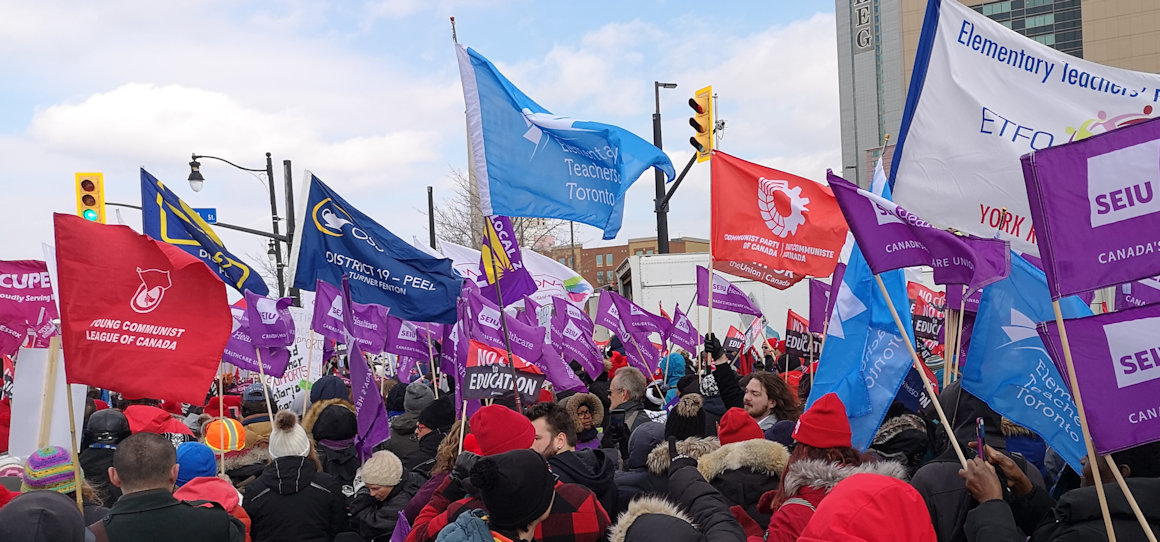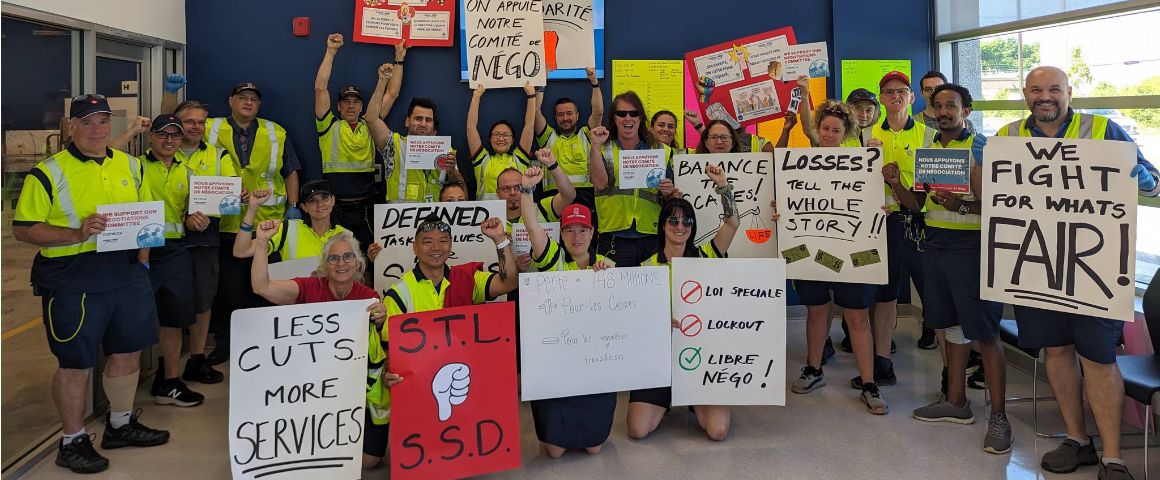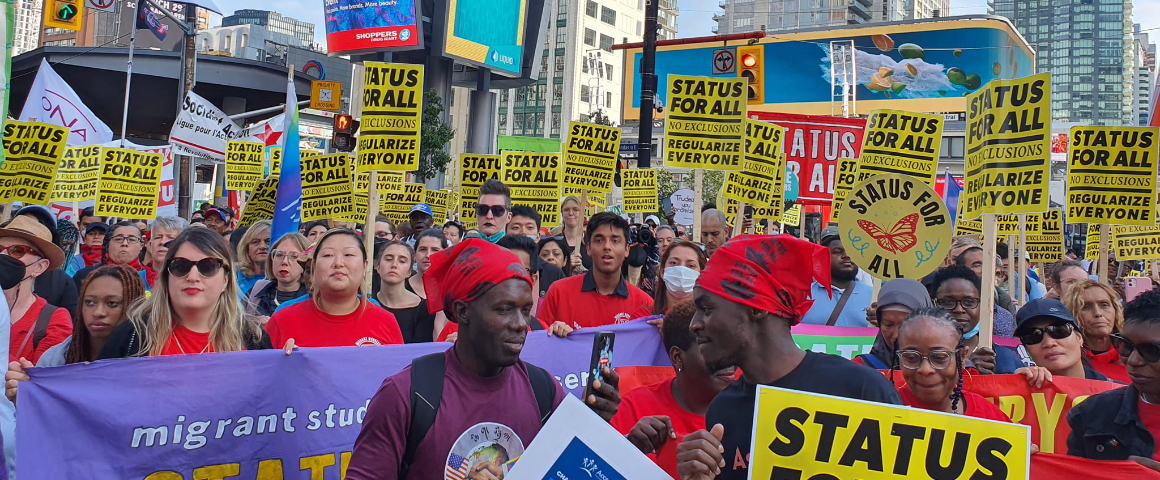Public secondary teachers and education workers represented by the Ontario Secondary School Teachers Federation (OSSTF) are currently voting on a tentative deal with the provincial government. If accepted, it will end job actions that began in November with withdrawal of administrative duties and escalated into a series of one-day strikes from December to February. Strike actions were paused in March and schools were closed due to the coronavirus.
OSSTF is the last of the education unions to settle with the province – most education workers, represented by the Canadian Union of Public Employees (CUPE) agreed to a deal in November, and unions representing teachers in the public elementary, French public and Catholic systems settled soon after schools were closed in March.
Each of the different unions has faced specific attacks from the Conservative government of Doug Ford, but key issues for all teachers were provincial plans to increase class size and introduce mandatory online learning for high school students. Both of these measures would result in job losses for teachers and reduced quality of classroom education for students. They are part of an ongoing Conservative strategy to underfund public schools and sell off school land and assets, promote private and for-profit education, weaken education unions and further undermine local democracy. This comprehensive attack helped forge a historic united front of the different unions.
Throughout the struggle, People’s Voice has spoken with teachers and education workers at picket lines and rallies across Ontario. Prior to the pandemic, public opinion was overwhelmingly on the side of the unions, who were understood to be fighting for the protection of public education. In the face of united mobilization by teachers, education workers, parents and students, which isolated the provincial government, Education Minister Stephen Lecce was forced to repeatedly back down at the negotiating table.
In March, however, momentum appeared to shift in favour of the provincial government, as the coronavirus crisis quickly absorbed almost all public attention. While political sentiment had not changed, active public support and engagement progressively eroded on a weekly basis. In an apparent effort to avoid having a deal imposed on them, the unions decided to go back to the table, using the previously-rejected provincial offer as a framework and attempting to mitigate the worst aspects.
But, with schools closed and parents focused on the pandemic, the active labour-community solidarity which had propelled the struggle forward was seriously weakened. As individual unions settled, beginning with the Ontario English Catholic Teachers Association (OECTA), it became increasingly difficult for the remaining ones to hold out for improvements.
Of the workers who spoke with PV after the tentative deals were signed, none was enthusiastic or satisfied with the outcome. To have fought back so many provincial attacks – many of which were more of a political nature than a contractual one – only to be sidelined at the end by a global pandemic beyond their control, is a bitter pill to swallow.
Yet, at the same time, everyone we spoke with insisted that the any assessment of the struggle be placed in the context of a progressive, year-long fight which was, on the whole, positive. True, there were moments of fracture – particularly through OECTA’s pattern of settling early, establishing a concession-riddled template for the other unions and then living off everyone else’s more militant coattails with a “me-too” clause. But there were also extended periods of militancy and unity.
Without the fight, the Ford government’s attacks would have been more comprehensive and the outcome worse. The Conservatives’ initial proposal for class size would have resulted in 25% fewer teaching jobs over a three year period. Their plan for four mandatory online courses would have meant even more job losses and significant funding cuts for school boards.
On a broader level, the education fight has been one of the few bright spots in an Ontario labour movement that has otherwise looked pretty dim. The Ontario Federation of Labour (OFL) was even drawn into organizing a provincial day of action at the Conservatives’ policy conference in Niagara Falls in February. While the turnout was not what many had hoped for, it was the first OFL-organized provincial protest in several years and it may help the federation leadership find its way back to a class-struggle orientation. This is possible if progressive currents in the labour movement, such as the Action Caucus, continue to rebuild and grow.
At the time of writing, we don’t know the outcome of the OSSTF votes. But regardless of whether or not the membership ratifies the present deal, it’s clear that the struggle to defend public education in Ontario has found new legs. When we asked what is next for this fight, education activists pointed to a much stronger capacity for mass, extra-parliamentary campaigning on political issues.
As one union activist said, “In alliance with the other unions and with the community, we took on a Tory majority that looked un-fucking-beatable a year ago. They could have implemented lots of their agenda through regulation, because it’s political and not all contract-based. Instead, we fought this fight and pushed almost all of it off the table. That’s a lot for us to build on.”
At the same time, this experience and the question of OECTA’s role in it, is drawing the question of Catholic school funding into sharper focus. One education worker told PV that the public system and the rest of the unions “have not been well served by this fake unity with OECTA.” The growing level of frustration highlights the need for a single, secular public school system, and some expect that the other education unions will be increasingly compelled to campaign more consistently and strongly for this goal.
While acknowledging that the pandemic had provided Ford and Lecce with some breathing space, most of the workers PV spoke with did not believe that this would last long. “Winston Churchill was loved during the war,” said one person, “but he got turfed at the first opportunity. This government will still be vulnerable, once we’re through this crisis.”
In fact, the crisis has been a factor in engaging more people around public policy issues. The pandemic has provoked widespread calls for public ownership of long-term care, for extending public healthcare to include pharmacare, and for increased minimum wage and Employment Insurance coverage. Notably, this increased engagement has been almost exclusively in the extra-parliamentary arena, since parliamentarians are nearly absent due to social distancing.
One person we interviewed summed it up perfectly. “This recent struggle for public education has given many people a new motivation to work together for meaningful political change. It’s given them experience, and there’s an increased awareness of the need to unite around a clear set of demands that go beyond just the education sector, beyond just defeating Tories at the ballot box.”
[hr gap=”10″]
Support socialist media!
If you found this article useful, please consider donating to People’s Voice.
We are 100% reader-supported, with no corporate or government funding.




